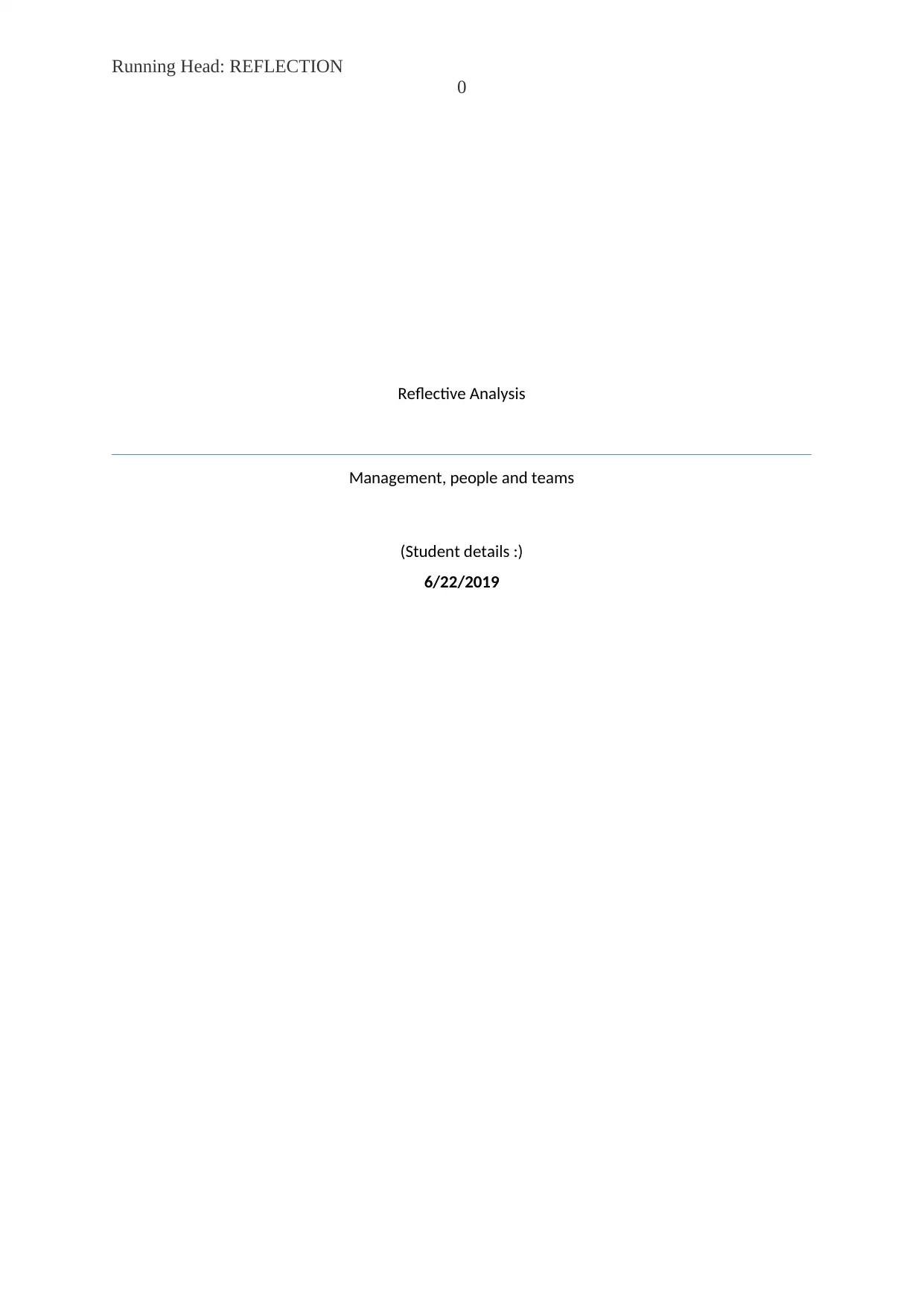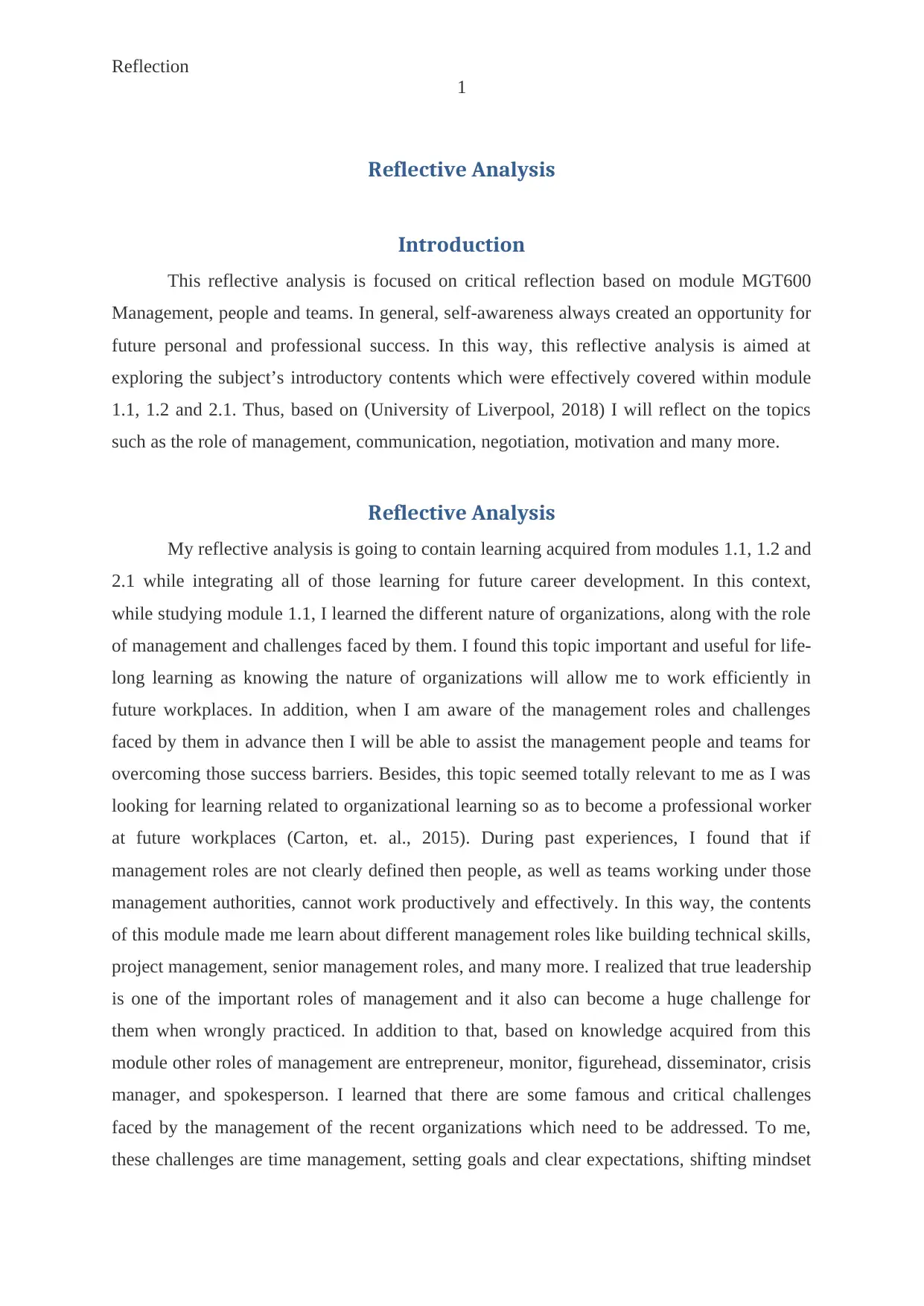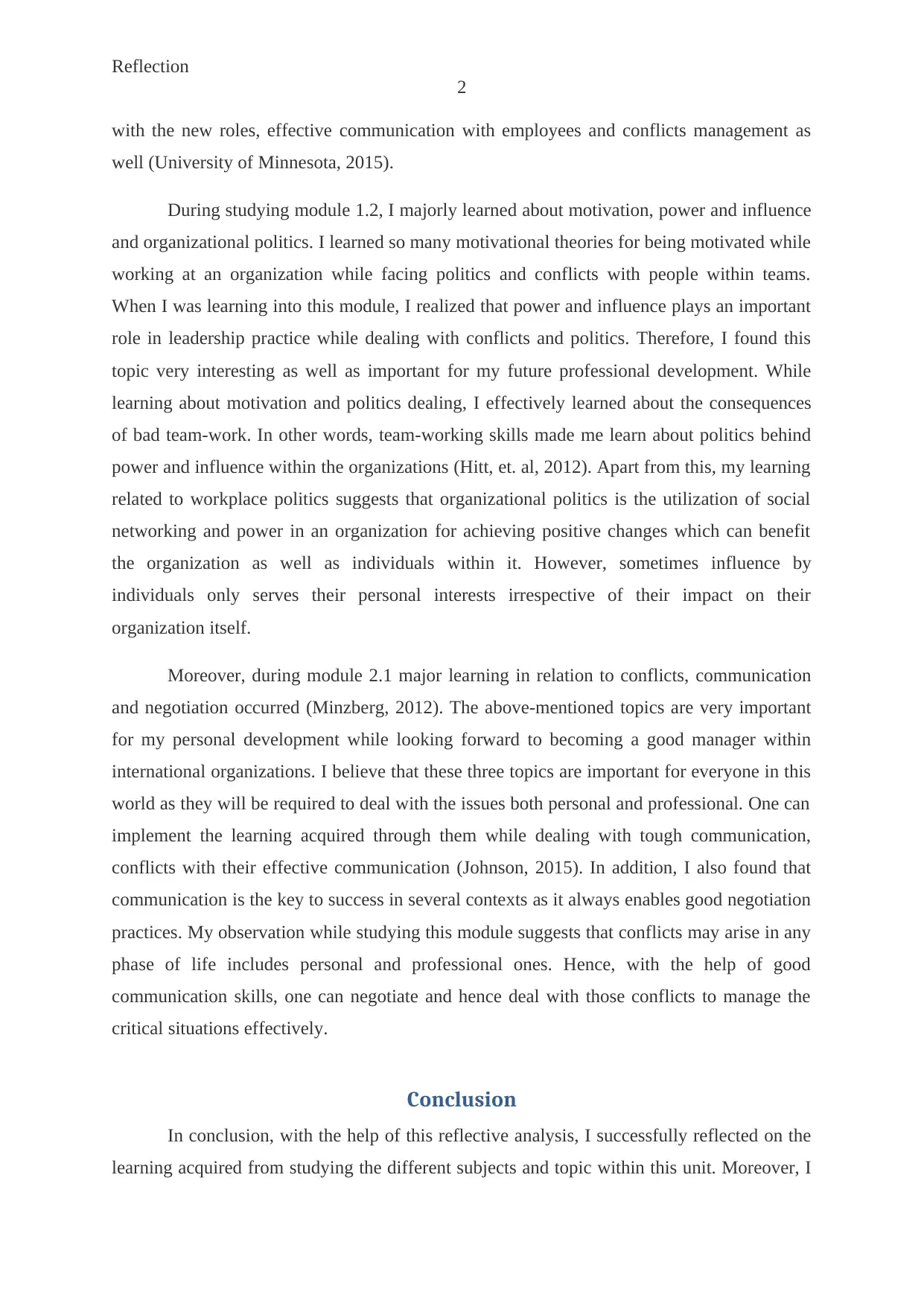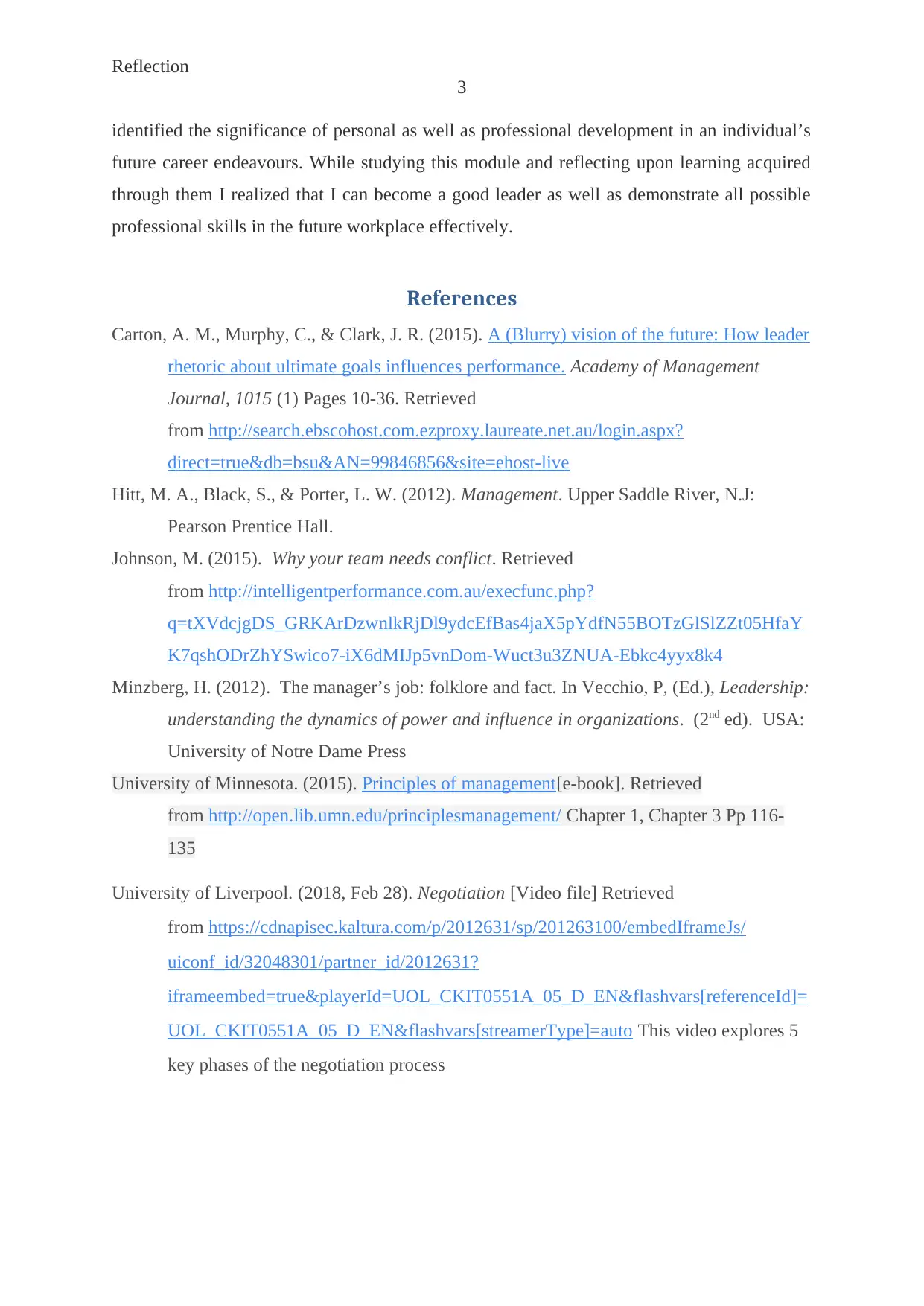University of Liverpool MGT600 Reflective Analysis Report
VerifiedAdded on 2022/12/19
|4
|1151
|1
Report
AI Summary
This reflective analysis examines the key concepts covered in the MGT600 module, focusing on management, people, and teams. The analysis explores the role of management, organizational structures, and the challenges faced by managers. It delves into topics such as motivation, power and influence, organizational politics, communication, negotiation, and conflict management. The author reflects on their learning from modules 1.1, 1.2, and 2.1, integrating these insights for future career development. The analysis highlights the importance of self-awareness, effective communication, and leadership skills in navigating organizational dynamics and achieving professional success. The author emphasizes the practical application of theoretical concepts, drawing connections between course content and real-world scenarios. The conclusion summarizes the key takeaways and underscores the author's enhanced understanding of management principles and their potential to contribute effectively in a professional setting.

Running Head: REFLECTION
0
Reflective Analysis
Management, people and teams
(Student details :)
6/22/2019
0
Reflective Analysis
Management, people and teams
(Student details :)
6/22/2019
Paraphrase This Document
Need a fresh take? Get an instant paraphrase of this document with our AI Paraphraser

Reflection
1
Reflective Analysis
Introduction
This reflective analysis is focused on critical reflection based on module MGT600
Management, people and teams. In general, self-awareness always created an opportunity for
future personal and professional success. In this way, this reflective analysis is aimed at
exploring the subject’s introductory contents which were effectively covered within module
1.1, 1.2 and 2.1. Thus, based on (University of Liverpool, 2018) I will reflect on the topics
such as the role of management, communication, negotiation, motivation and many more.
Reflective Analysis
My reflective analysis is going to contain learning acquired from modules 1.1, 1.2 and
2.1 while integrating all of those learning for future career development. In this context,
while studying module 1.1, I learned the different nature of organizations, along with the role
of management and challenges faced by them. I found this topic important and useful for life-
long learning as knowing the nature of organizations will allow me to work efficiently in
future workplaces. In addition, when I am aware of the management roles and challenges
faced by them in advance then I will be able to assist the management people and teams for
overcoming those success barriers. Besides, this topic seemed totally relevant to me as I was
looking for learning related to organizational learning so as to become a professional worker
at future workplaces (Carton, et. al., 2015). During past experiences, I found that if
management roles are not clearly defined then people, as well as teams working under those
management authorities, cannot work productively and effectively. In this way, the contents
of this module made me learn about different management roles like building technical skills,
project management, senior management roles, and many more. I realized that true leadership
is one of the important roles of management and it also can become a huge challenge for
them when wrongly practiced. In addition to that, based on knowledge acquired from this
module other roles of management are entrepreneur, monitor, figurehead, disseminator, crisis
manager, and spokesperson. I learned that there are some famous and critical challenges
faced by the management of the recent organizations which need to be addressed. To me,
these challenges are time management, setting goals and clear expectations, shifting mindset
1
Reflective Analysis
Introduction
This reflective analysis is focused on critical reflection based on module MGT600
Management, people and teams. In general, self-awareness always created an opportunity for
future personal and professional success. In this way, this reflective analysis is aimed at
exploring the subject’s introductory contents which were effectively covered within module
1.1, 1.2 and 2.1. Thus, based on (University of Liverpool, 2018) I will reflect on the topics
such as the role of management, communication, negotiation, motivation and many more.
Reflective Analysis
My reflective analysis is going to contain learning acquired from modules 1.1, 1.2 and
2.1 while integrating all of those learning for future career development. In this context,
while studying module 1.1, I learned the different nature of organizations, along with the role
of management and challenges faced by them. I found this topic important and useful for life-
long learning as knowing the nature of organizations will allow me to work efficiently in
future workplaces. In addition, when I am aware of the management roles and challenges
faced by them in advance then I will be able to assist the management people and teams for
overcoming those success barriers. Besides, this topic seemed totally relevant to me as I was
looking for learning related to organizational learning so as to become a professional worker
at future workplaces (Carton, et. al., 2015). During past experiences, I found that if
management roles are not clearly defined then people, as well as teams working under those
management authorities, cannot work productively and effectively. In this way, the contents
of this module made me learn about different management roles like building technical skills,
project management, senior management roles, and many more. I realized that true leadership
is one of the important roles of management and it also can become a huge challenge for
them when wrongly practiced. In addition to that, based on knowledge acquired from this
module other roles of management are entrepreneur, monitor, figurehead, disseminator, crisis
manager, and spokesperson. I learned that there are some famous and critical challenges
faced by the management of the recent organizations which need to be addressed. To me,
these challenges are time management, setting goals and clear expectations, shifting mindset

Reflection
2
with the new roles, effective communication with employees and conflicts management as
well (University of Minnesota, 2015).
During studying module 1.2, I majorly learned about motivation, power and influence
and organizational politics. I learned so many motivational theories for being motivated while
working at an organization while facing politics and conflicts with people within teams.
When I was learning into this module, I realized that power and influence plays an important
role in leadership practice while dealing with conflicts and politics. Therefore, I found this
topic very interesting as well as important for my future professional development. While
learning about motivation and politics dealing, I effectively learned about the consequences
of bad team-work. In other words, team-working skills made me learn about politics behind
power and influence within the organizations (Hitt, et. al, 2012). Apart from this, my learning
related to workplace politics suggests that organizational politics is the utilization of social
networking and power in an organization for achieving positive changes which can benefit
the organization as well as individuals within it. However, sometimes influence by
individuals only serves their personal interests irrespective of their impact on their
organization itself.
Moreover, during module 2.1 major learning in relation to conflicts, communication
and negotiation occurred (Minzberg, 2012). The above-mentioned topics are very important
for my personal development while looking forward to becoming a good manager within
international organizations. I believe that these three topics are important for everyone in this
world as they will be required to deal with the issues both personal and professional. One can
implement the learning acquired through them while dealing with tough communication,
conflicts with their effective communication (Johnson, 2015). In addition, I also found that
communication is the key to success in several contexts as it always enables good negotiation
practices. My observation while studying this module suggests that conflicts may arise in any
phase of life includes personal and professional ones. Hence, with the help of good
communication skills, one can negotiate and hence deal with those conflicts to manage the
critical situations effectively.
Conclusion
In conclusion, with the help of this reflective analysis, I successfully reflected on the
learning acquired from studying the different subjects and topic within this unit. Moreover, I
2
with the new roles, effective communication with employees and conflicts management as
well (University of Minnesota, 2015).
During studying module 1.2, I majorly learned about motivation, power and influence
and organizational politics. I learned so many motivational theories for being motivated while
working at an organization while facing politics and conflicts with people within teams.
When I was learning into this module, I realized that power and influence plays an important
role in leadership practice while dealing with conflicts and politics. Therefore, I found this
topic very interesting as well as important for my future professional development. While
learning about motivation and politics dealing, I effectively learned about the consequences
of bad team-work. In other words, team-working skills made me learn about politics behind
power and influence within the organizations (Hitt, et. al, 2012). Apart from this, my learning
related to workplace politics suggests that organizational politics is the utilization of social
networking and power in an organization for achieving positive changes which can benefit
the organization as well as individuals within it. However, sometimes influence by
individuals only serves their personal interests irrespective of their impact on their
organization itself.
Moreover, during module 2.1 major learning in relation to conflicts, communication
and negotiation occurred (Minzberg, 2012). The above-mentioned topics are very important
for my personal development while looking forward to becoming a good manager within
international organizations. I believe that these three topics are important for everyone in this
world as they will be required to deal with the issues both personal and professional. One can
implement the learning acquired through them while dealing with tough communication,
conflicts with their effective communication (Johnson, 2015). In addition, I also found that
communication is the key to success in several contexts as it always enables good negotiation
practices. My observation while studying this module suggests that conflicts may arise in any
phase of life includes personal and professional ones. Hence, with the help of good
communication skills, one can negotiate and hence deal with those conflicts to manage the
critical situations effectively.
Conclusion
In conclusion, with the help of this reflective analysis, I successfully reflected on the
learning acquired from studying the different subjects and topic within this unit. Moreover, I
⊘ This is a preview!⊘
Do you want full access?
Subscribe today to unlock all pages.

Trusted by 1+ million students worldwide

Reflection
3
identified the significance of personal as well as professional development in an individual’s
future career endeavours. While studying this module and reflecting upon learning acquired
through them I realized that I can become a good leader as well as demonstrate all possible
professional skills in the future workplace effectively.
References
Carton, A. M., Murphy, C., & Clark, J. R. (2015). A (Blurry) vision of the future: How leader
rhetoric about ultimate goals influences performance. Academy of Management
Journal, 1015 (1) Pages 10-36. Retrieved
from http://search.ebscohost.com.ezproxy.laureate.net.au/login.aspx?
direct=true&db=bsu&AN=99846856&site=ehost-live
Hitt, M. A., Black, S., & Porter, L. W. (2012). Management. Upper Saddle River, N.J:
Pearson Prentice Hall.
Johnson, M. (2015). Why your team needs conflict. Retrieved
from http://intelligentperformance.com.au/execfunc.php?
q=tXVdcjgDS_GRKArDzwnlkRjDl9ydcEfBas4jaX5pYdfN55BOTzGlSlZZt05HfaY
K7qshODrZhYSwico7-iX6dMIJp5vnDom-Wuct3u3ZNUA-Ebkc4yyx8k4
Minzberg, H. (2012). The manager’s job: folklore and fact. In Vecchio, P, (Ed.), Leadership:
understanding the dynamics of power and influence in organizations. (2nd ed). USA:
University of Notre Dame Press
University of Minnesota. (2015). Principles of management[e-book]. Retrieved
from http://open.lib.umn.edu/principlesmanagement/ Chapter 1, Chapter 3 Pp 116-
135
University of Liverpool. (2018, Feb 28). Negotiation [Video file] Retrieved
from https://cdnapisec.kaltura.com/p/2012631/sp/201263100/embedIframeJs/
uiconf_id/32048301/partner_id/2012631?
iframeembed=true&playerId=UOL_CKIT0551A_05_D_EN&flashvars[referenceId]=
UOL_CKIT0551A_05_D_EN&flashvars[streamerType]=auto This video explores 5
key phases of the negotiation process
3
identified the significance of personal as well as professional development in an individual’s
future career endeavours. While studying this module and reflecting upon learning acquired
through them I realized that I can become a good leader as well as demonstrate all possible
professional skills in the future workplace effectively.
References
Carton, A. M., Murphy, C., & Clark, J. R. (2015). A (Blurry) vision of the future: How leader
rhetoric about ultimate goals influences performance. Academy of Management
Journal, 1015 (1) Pages 10-36. Retrieved
from http://search.ebscohost.com.ezproxy.laureate.net.au/login.aspx?
direct=true&db=bsu&AN=99846856&site=ehost-live
Hitt, M. A., Black, S., & Porter, L. W. (2012). Management. Upper Saddle River, N.J:
Pearson Prentice Hall.
Johnson, M. (2015). Why your team needs conflict. Retrieved
from http://intelligentperformance.com.au/execfunc.php?
q=tXVdcjgDS_GRKArDzwnlkRjDl9ydcEfBas4jaX5pYdfN55BOTzGlSlZZt05HfaY
K7qshODrZhYSwico7-iX6dMIJp5vnDom-Wuct3u3ZNUA-Ebkc4yyx8k4
Minzberg, H. (2012). The manager’s job: folklore and fact. In Vecchio, P, (Ed.), Leadership:
understanding the dynamics of power and influence in organizations. (2nd ed). USA:
University of Notre Dame Press
University of Minnesota. (2015). Principles of management[e-book]. Retrieved
from http://open.lib.umn.edu/principlesmanagement/ Chapter 1, Chapter 3 Pp 116-
135
University of Liverpool. (2018, Feb 28). Negotiation [Video file] Retrieved
from https://cdnapisec.kaltura.com/p/2012631/sp/201263100/embedIframeJs/
uiconf_id/32048301/partner_id/2012631?
iframeembed=true&playerId=UOL_CKIT0551A_05_D_EN&flashvars[referenceId]=
UOL_CKIT0551A_05_D_EN&flashvars[streamerType]=auto This video explores 5
key phases of the negotiation process
1 out of 4
Related Documents
Your All-in-One AI-Powered Toolkit for Academic Success.
+13062052269
info@desklib.com
Available 24*7 on WhatsApp / Email
![[object Object]](/_next/static/media/star-bottom.7253800d.svg)
Unlock your academic potential
Copyright © 2020–2026 A2Z Services. All Rights Reserved. Developed and managed by ZUCOL.




